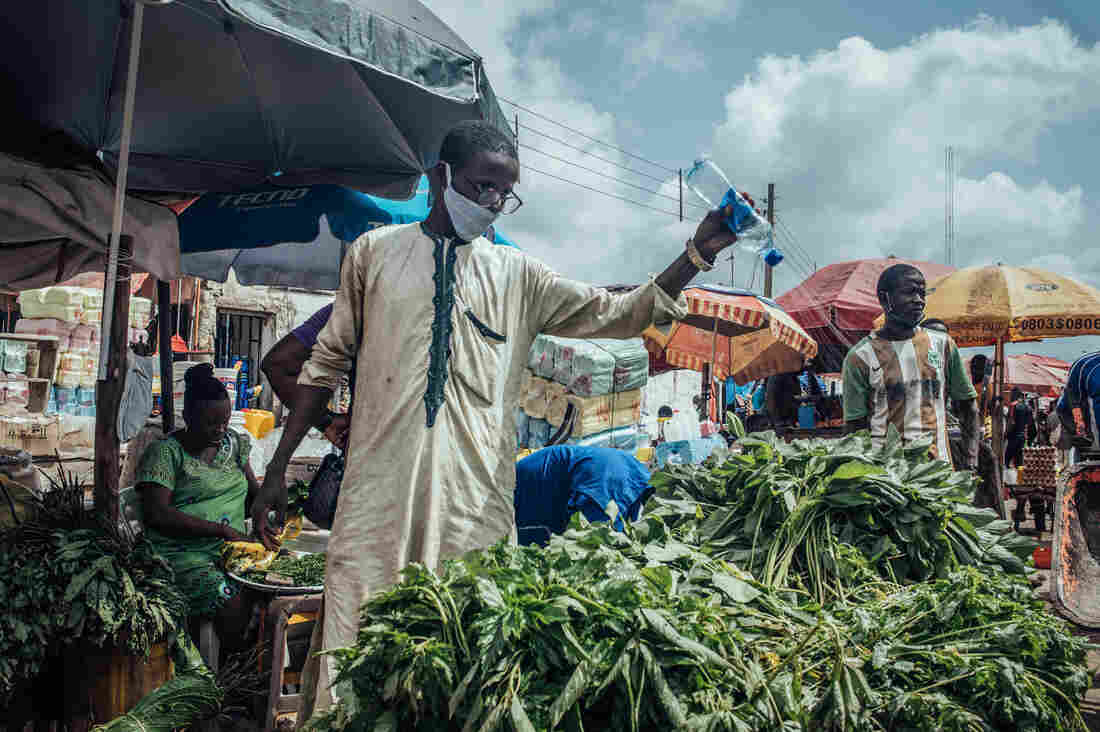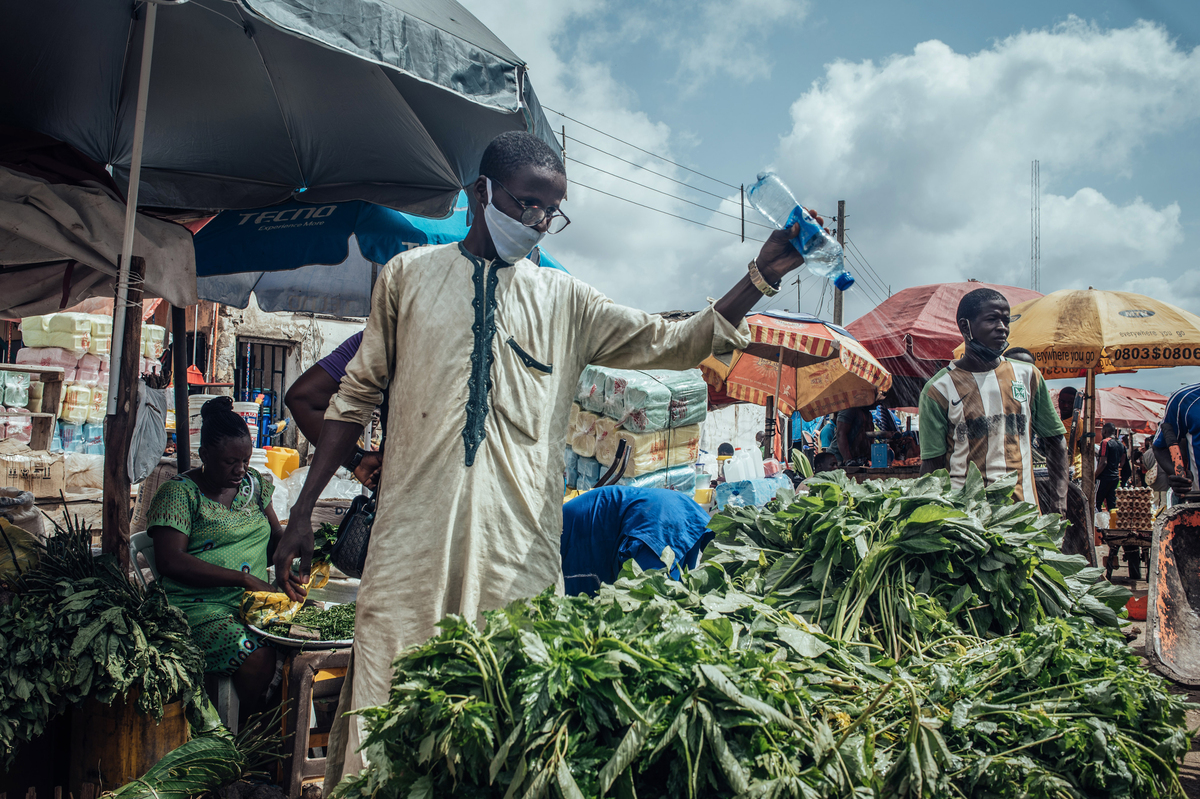


A vendor waters fresh greens for sale at a stall in a market in Abuja, Nigeria.
KC Nwakalor/Bloomberg via Getty Images
hide caption
toggle caption
KC Nwakalor/Bloomberg via Getty Images
A vendor waters fresh greens for sale at a stall in a market in Abuja, Nigeria.
KC Nwakalor/Bloomberg via Getty Images
When the new coronavirus started spreading around the world, there were dire warnings about what would happen when it hit African countries.
An earlier U.N. estimate predicted up to 3.3 million deaths in Africa, if no interventions were put in place. Top epidemiologists predicted panic, saying the death rate would be higher than Europe or China. But things have so far turned out differently in sub-Saharan Africa.
Now, there are a range of predictions – from pessimistic to guardedly optimistic.
“We are not seeing that rapid increase in the number of cases as we had actually predicted,” says Benson Droti, an epidemiologist with the World Health Organization’s Regional Office for Africa.
About three months since Africa recorded its first case of COVID-19, there have been fewer recorded deaths and cases than any other region in the world. According to the Africa CDC, the continent has reported nearly 200,000 cases and 5,334 deaths.
Droti and his colleagues at WHO wanted to take a new look at what was happening on the Continent, so they developed a new model last month for what the future might look like.
In their model, they took into account Africa’s young population — the fact that many countries have median ages in the teens. They included how much harder it is for people to move around because of poor roads. And they also took stock of the different mitigation efforts each country took.
“Have markets been closed? Have schools been closed and so on and so on,” Droti says.
In fact, many African countries took action very early on. With few reported cases, countries shut down airports, closed schools and some, like Uganda and South Africa, instituted draconian lockdowns.



The WHO model found that because of that many parts of Africa would be spared the virus exponential spread of the virus. The infection rate and death rate would be significantly lower than the hardest hit European and American countries have faced. Its worst case scenario predicts about 189,000 Africans will die of COVID-19 in a year.
One early model out of the London School of Hygiene and Tropical Medicine had projected that many deaths in Nigeria alone.
But there are critics of the WHO study. Carl Pearson, an epidemiologist at the London School of Hygiene and Tropical Medicine, says it’s making flawed assumptions. For example, it assumes Africa’s young population will be more resilient.
“But what we don’t know are things like: What is in the interaction with malnutrition, with other infectious disease, with a bunch of risk factors that are present in Africa but we don’t know anything about in the rest of the world,” he says.
He thinks it’s too early to make these kinds of predictions, especially because African countries are under testing and may be missing cases.
“I’ve always sort of been waiting for the other shoe to drop,” he says.
He says he is already seeing worrying signs in countries like Nigeria and South Africa, where cases are indeed rising exponentially. In Nigeria on Monday, the health minister admitted that as many 60 percent of mysterious deaths reported in the northern Kano state were likely caused by the new coronavirus.
But Pearson put out an early model for the African continent that turned out to overestimate the number of coronavirus cases in many countries.
Modeling, he says, is hard — even harder than predicting the path of a hurricane.
“An epidemic is different in that when I decide to react to the quote unquote storm, that fundamentally changes the trajectory,” he says.
In other words, what people and governments do plays a huge role in how a pandemic evolves.
Droti, of the World Health Organization, says that points to another huge issue with models.
“A model is only as good as the assumptions that you put in,” he says.
Part of the problem in Africa, he says, is that many times the world assumes the continent will fail at everything.
“People expect that the Africa region will need to be doing very poorly in all aspects,” he says.
Shaun Truelove, who studies international health at Johns Hopkins Bloomberg School of Public Health, says the team at WHO is making a “valiant attempt” at modeling an incredibly diverse continent with dozens of countries.
But he says many of the estimates are being made at a countrywide level, which means huge African cities are being given less weight than rural Africa.
“I think that heterogeneity is something that may have a big impact here and I think we’re going to start to see it soon what that really means,” he says.
William Moss, an epidemiologist at Johns Hopkins, believes that the new WHO model actually presents a complex picture.
At one level it does, indeed, take a different view of Africa — full of countries that instituted aggressive and commendable public health policies.
“It’s not painting Africa as this dire place that is overwhelmed by health problems,” he says.
But in another way, he says, it takes a realistic view. It warns that even with a slower spread of infection and lower death rate, the continent’s poor health infrastructure is very likely to be overwhelmed.
To Ngozi Erondu, a research fellow at the Chatham House Centre for Global Health Security, even this study doesn’t bring hope.
“One hundred and ninety thousand additional deaths on a continent that is suffering from many co-infections, many diseases, malnutrition and everything else, there is no rosy picture here,” she says.


